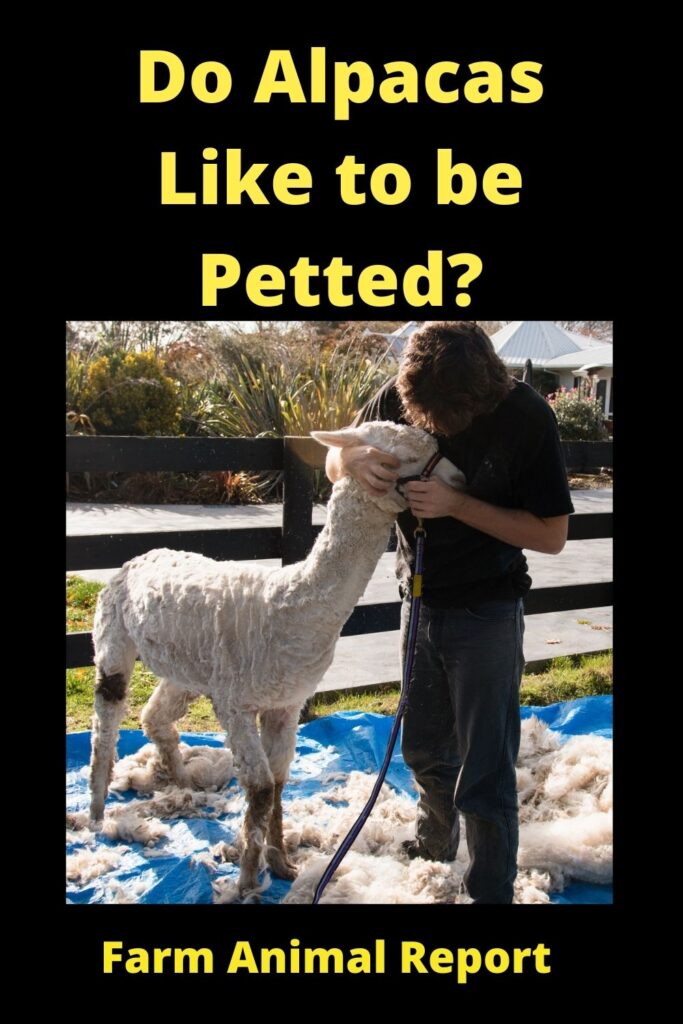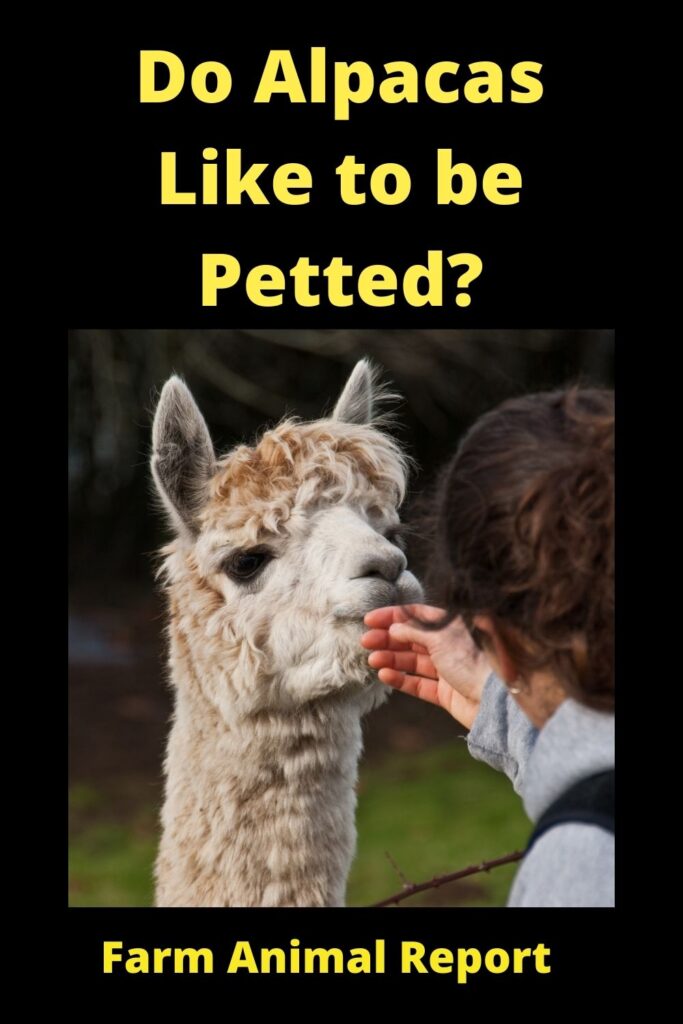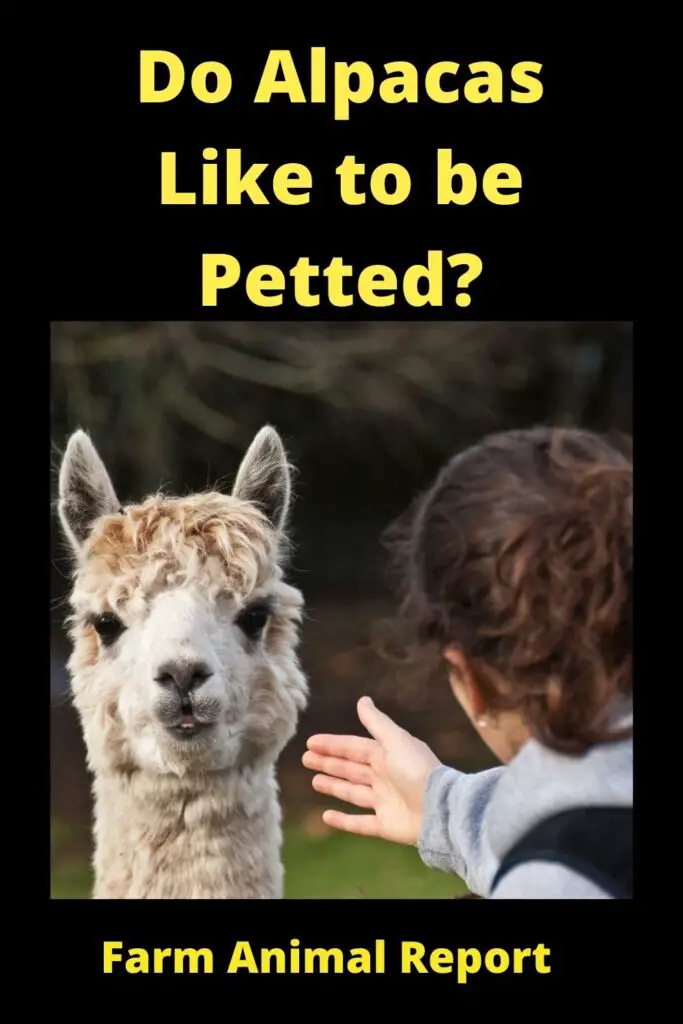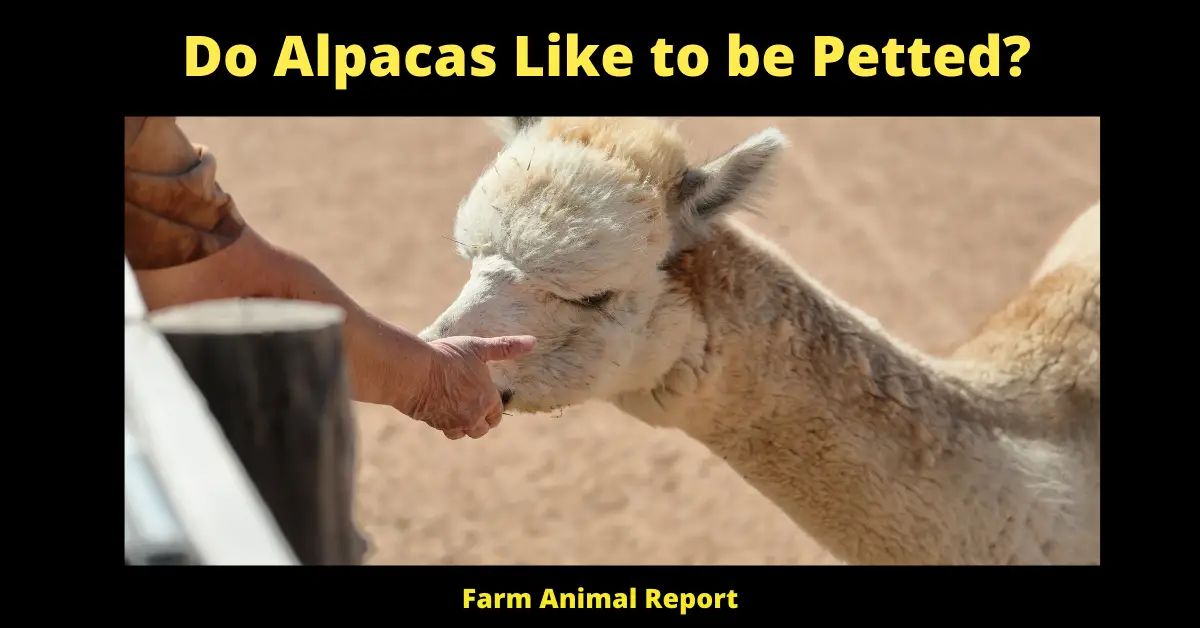Do Alpacas Like to be Petted?
As a General rule Alpacas are generally not fond of being touched, yet they may tolerate it from some individuals. An alpaca may love being petted by a favored person or member of the family. But, it is not the case every time. Their earlier socialization will determine their attitude toward people, and if they have been nurtured with love and care, they may even like being petted. Always get permission from the alpaca’s owner before touching the animal.
It is Possible that Alpacas Enjoy Being Petted – Sometimes
Do Alpacas Like to be Petted – The veterinarians say that if you can get an alpaca acclimated to human touch, interaction, and even your voice, he or she will be happier and calmer overall. And if they have frequent human engagement, they may become friends.
For the avoidance of doubt, alpacas can and do love being touched. If they’re accustomed to it, and so are you, or at the very least, the general public. Some alpacas, such as those found at a petting zoo, are completely devoted to humans, or at the very least, to the gifts, they receive as a result of their interactions.
Furthermore, petting your socialized alpacas will result in a reduced heart rate, better general blood pressure, and fewer concerns with balking and poor camelid behavior on the part of the animal.
Aside from that, alpacas do not appreciate being handled, rubbed, or otherwise touched. When they see it, they get fearful, and their prey instincts kick in. When this happens, most alpacas will freeze, shift their position quickly (either getting up or laying down), or do all of the above at once.
The response of an alpaca to being touched is far more similar to that of a sheep than that of other animals.
So, just because an alpaca remains still while being handled does not imply that they enjoy it. In fact, if they’re truly standing motionless, it indicates the inverse of what you’d expect. It indicates that they are frightened to the point of paralysis and are unable to move.

Are Alpacas Social?
Yes, Alpacas are extremely social animals. They are friendly and curious, and with the right training, they can make wonderful companions.
Alpacas are gentle and kind animals. They are usually considered to be safe. In contrast to other animals, they are not known to bite or strike. They do bite from time to time, but only for a good reason. If they see a human coming, they will cluck to show their kind disposition.
They are excellent pets and are quite easy to care for. They have an enthralling allure, are clever, and are inherently interested in nature.
Alpacas are peaceful, and they make excellent trekking companions. Once your relationship and trust with them have grown, they will allow you to embrace and even touch their necks and backs if you ask them to.
When Alpacas/Llamas Do Not Like to Be Touched?
We must remember that these animals aren’t used to humans, and they are often wary of being touched. They also don’t like it when you sneak up on them and get close to them. After all, it is the manner in which a predator would approach them.
If you are fortunate enough to sneak up on an alpaca, please refrain from using the ninja-style petting method on it. Although you may be able to pet the unfortunate animal, you will most likely startle it, making it that much more difficult for anybody else to approach the animal in the future.
Instead, continue reading to learn how to properly approach, converse with, and pet an alpaca in the future.
If They disapprove you might get alpacas spit coming your way.
A Word of Advice on Petting Alpacas (Yours or Not)
Do Alpacas Like to be Petted? Regardless of whether the alpaca in the herd is yours or not, let’s speak about the right method to approach, talk to, and pet the alpaca to ensure that it is a nice experience for all. It also reaffirms to the alpaca that you are a trustworthy individual who is deserving of being permitted inside their area.
If the alpaca does not belong to you, you should first get permission from the owner. They can inform you of the alpaca’s preferred style of engagement in this manner. The wisest course of action is to remain on your side of the fence if the owner isn’t there (or available). With that barrier in place, the alpacas will most likely feel more secure.
Then, lookout out for any signs that have been placed and make sure you adhere to them. It’s important to remember that you are on someone else’s property.
Allow the alpacas to come up to you if they so choose. Offer out your hand so that they may take a whiff of you. If everything goes well, you can try giving them a pat on the back. Give them some breathing room if they start to back up or freeze. When speaking, make sure you’re using a kind tone of voice and body language to communicate. The alpacas will recognize you as one of the good guys as a result of this.
If you own the alpaca, much of the same rules apply, with the exception of the ones that pertain to you being on someone else’s property. You are the owner of the alpaca, which is a member of your farm’s animals.
So, in this scenario, allow your alpaca some time to get used to being around you. Allow them to become accustomed to your scent, your physical presence, and your temperament. Allow them enough time to sniff you and come up to you when they’ve done so. Be gentle with them and allow them some time before you begin to pet them.
Your alpacas will become familiar with and trust you as time passes. And once they reach that stage, they will love (or at the very least tolerate) your company as well as any petting you may give them.

Do Alpacas Bond with Humans?
Yes, alpacas and humans may form strong bonds. The ability to do so, however, demands a certain amount of trust. Alpacas are prey animals in the wild, and as a result, they are often aware of their surroundings and suspicious of strangers. Constant care, affection, attention, and rewards, on the other hand, might help them trust and bond with you more quickly. They eventually begin to know and trust you as their guardians and caretakers
. This helps to build a deep link between the two of you. Alpacas are excellent pets since they are easy to teach and maintain a tidy appearance. They require less upkeep because they are simple to care for. It is possible to train dogs and alpacas to get along. This has been demonstrated to be effective. The cost of an alpaca varies according to where you live, how old it is, what gender it is, and its conformation. Alpacas do not scent and do not bite unless they are provoked. When properly cared for, they develop a relationship with people and learn to trust them.
How do you know if an Alpaca likes You?
Whenever an Alpaca likes you, they will demonstrate their devotion through noises and affectionate behavior. An alpaca can kiss you, nuzzle your hand, gallop towards you, or even kiss you.
A contented and peaceful alpaca hums to communicate his or her adoration. They also use humming to communicate with one another. Mother and cria (baby alpaca) hum incessantly to one another in order to connect and communicate with one another.
Here is a list of the noises made by alpacas, as well as their meanings.
- Snorting – They snort to warn other alpacas to stay out of their personal area.
- Humming — Alpacas hum to communicate and interact with one another, as well as to convey displeasure or sadness when isolated or removed from the herd. They can also hum when they’re nervous, joyful, or inquisitive about something.
- Clucking – They cluck to express pleasant behavior or concern.
These next noises aren’t expressing any feelings of fondness. However, they might be useful in educating you on what not to do, so they are still vital to be aware of.
- Orgling — A strange rustling sound created by male alpacas when mating or attempting to mate.
- Alarm or alert call — a hee-haw sound that sounds like a donkey. It conveys a sense of dread.
- Screaming or screeching — a siren-like sound produced when an alpaca is not handled properly is afraid or is terrified
How to Raise Alpacas who enjoy Human Interaction and Touch?
If newborn alpacas have been raised near humans since they were crias (baby alpacas, male or female), they will have a lot easier time associating with humans and will like being touched much more. So, as soon as your alpaca cria is born, begin sending time with them. Pet them on a daily basis to help them become used to human contact.
What happens if you decide to purchase an adult alpaca to add to your backyard homesteading operation? In that situation, you won’t have been able to socialize them since they were babies since you won’t have been able to train them since they were babies.

On the other hand, you can choose an alpaca breeder or rancher who spends significant time with their herd. Consult with them to choose a well-socialized animal that will meet your requirements and has already been trained to appreciate being around people and other animals.
Make certain that you purchase the appropriate amount of alpacas. In this way, Alpacas will feel more secure when they relocate to your farm because they will have a companion with them as well.
Do Alpacas make Good Indoor Pets?
Alpacas may make excellent indoor pets if they are provided with sufficient contact, room and have their basic requirements satisfied. Whether it is made up of other animals or a human family, their adoptive herd will also be necessary for them.
Are Alpacas Intelligent?
Yes, Alpacas are extremely intelligent animals. They have a wide range of abilities. They are remarkably alert animals that respond rapidly to halter and lead training. Through their body posture, tail and ear movements, and a range of noises, they continually interact with one another. The most frequently heard sound is a faint humming.
Is it Possible to Run Alpacas Alongside other Livestock?
Alpacas may form strong bonds with a variety of different species. It goes without saying that alpacas and huge aggressive dogs do not make a good match, but there are several examples of calm dogs getting along with alpacas.
Sheep and goats have been used as fox guards in small numbers and have been quite effective in this endeavor. If they are placed in this scenario, they have a tendency to form bonds with the foster herd and are inherently violent toward foxes. If an alpaca is kept with other livestock, it will take up the internal parasites associated with the other animals and should be subjected to the same worming regimen as the other animals. When running alpacas alongside cattle or horses, extreme caution should be exercised due to the possibility of the alpacas being kicked.
Are Alpacas a Threat to Human Safety?
No they are not a threat, but using caution when dealing with them will keep you from being in harm’s way. They do not have any harmful features like sharp front teeth, horns, or claws, which would make them deadly. The only thing they can do is kick with their rear legs, but they don’t kick hard enough to inflict any serious injury—although bruises can occur as a result of their actions. Knowing which of your Alpacas are prone to kicking and restraining them when necessary is good for the owner.
Alpacas’ eyes are located on the side of their heads; they cannot see anything immediately in front of or behind them. So never try to approach them from the rear end. Alpacas may become terrified and kick when approached from behind.
The majority of adult males will always have razor-sharp fighting teeth—but they will only be utilized against other males when they are demonstrating their dominance over their herd during their male-to-male herd dominance engagements. The herd may contain a male who has had his ear scissored, or you may even discover that another bull has castrated a male.
Fighting teeth should be maintained cut by conscientious owners; thus, this is an uncommon occurrence. Alpacas, on the other hand, are largely harmless to humans—unless you happen to put your finger in the wrong spot when cutting their teeth! If necessary, try to use a dog chew to keep their jaws open until the situation calls for it, and then we use tin snips to clip the tips off the tops of their teeth. There are power tools designed particularly for fighting and trimming the front teeth.
What Method is used to Transport Alpacas?
Alpacas may be carried over short distances in a minivan (regular-sized van) or in the back seat of a pickup truck with a trailer hitch. Alpacas will “sit” or “cush” in the car/van as soon as it begins to move. Try to use the 16-foot stock trailer for long distances to transport these animals.
5 Amazing Things An Alpaca Can Be Taught
In contrast to dogs and cats, most alpacas do not particularly enjoy being walked, especially by a stranger, which can make training challenging (as discussed above). Fortunately, their inherent social behavior as herd animals may provide valuable information on how to effectively train them to do particular responsive behaviors. They, for example, do not respond well to any form of aggressive, noisy, or flashy behavior; negative reinforcement does not function well with an animal that would be prey in the wild since the animal will freak out as a result of the negative reinforcement.
However, with calm training, food rewards, and patience, an alpaca may learn to do a wide range of behaviors, ranging from spectacular tricks to simple passive actions like remaining still when in a harness and holding its head motionless. A basic clicker, similar to the one you’d use to educate a dog or a horse, is frequently the most effective tool for training an alpaca. When the alpaca accomplishes what you desire, you reward him with a single click, followed by tasty food. And, before long, the alpaca is satisfied with nothing more than the sound of the clicker.
Here are some amazing things that alpacas can do.
1. Sit
Although this appears to be a simple task, alpacas spend most of their waking hours standing up, and it takes a significant effort for them to fold their legs and plop down on the ground. If there is no convincing cause for them to do so, it’s normal that they would be reluctant to do so. They must fold their front legs and let their full weight fall on their knees. They can, however, be taught to sit if they are given the opportunity.
2. Litter Training
If left to their own will, alpacas would construct a type of toilet by pooping exclusively in one specific location. That tendency can be developed further until the alpacas are almost completely litter trained. Some alpaca owners have built litter boxes (which must be custom-made because alpacas are considerably larger than any cat for whom a litter box is generally created) and filled them with wood shavings. The alpacas appear to like eating. Others have purchased litter boxes.

3. Therapy
Animals, ranging from canines and felines to farm animals, are frequently employed in therapeutic settings. Alpacas have lately been employed for the same purpose, as persons with physical or mental disabilities frequently find it simpler to engage with animals than with other people.
4. Tow Carts
In contrast to pigs, chickens, and goats, Alpacas are members of the same family as animals of burden, such as the camel and the llama, and they have been specifically developed to lug heavy loads. Even though alpacas are rather tiny compared to their kin, they can be trained to pull a wagon full of children with relative ease.
5. Play Catch
A small herd of alpacas on Nina Faust’s farm in Alaska, and she trains them to undertake a variety of enrichment activities things to keep their brains active – to keep them happy and healthy. Both of these abilities are incredibly charming, but none is particularly practical. They can pick up and toss a beach ball around, and they can ring a bell with their noses on cue, neither of which is particularly useful, but both of which are very sweet.
18 ways Alpaca Farmers make Money
Final Thoughts
Alpacas may be a wonderful addition to any backyard homestead – but they each have their own personalities, interests, and peculiarities that must be taken into consideration. So have a look around and speak with an alpaca farmer or rancher to locate someone who will be a useful resource for you – as well as someone who can assist you in selecting the ideal animal for your backyard farm.
After that, make sure to give everyone enough time to become used to one another and the new environment. You’ll be establishing trust between your alpacas and you (and your family), allowing petting them to be a pleasurable and calming pastime for everyone who participates in the activity.


